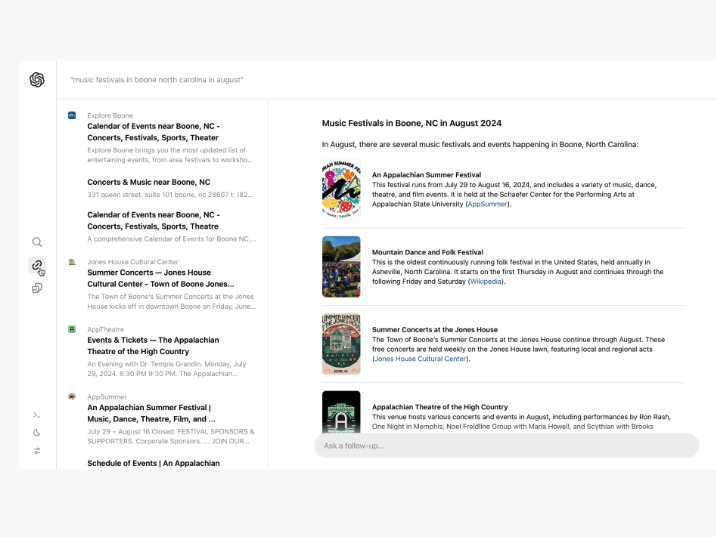
OpenAI has begun testing a prototype of its AI-driven search engine SearchGPT with publishers, claiming it will “help users connect” with news sites rather than simply eat up all their traffic.
The ChatGPT parent company addressed publisher concerns about AI-driven search directly in its post announcing the prototype on Thursday, saying SearchGPT “is designed to help users connect with publishers by prominently citing and linking to them in searches”.
The prototype is not yet open to the public, having launched for now “to a small group of users and publishers to get feedback”. Anyone with an OpenAI account is invited to join a waitlist for access.
ChatGPT can be asked to browse the web via Microsoft search engine Bing, but the training data on which the latest model (GPT-4) is built only goes up to December 2023. However SearchGPT will surface real-time information from the internet in response to search queries.
The advent of AI-enabled search has worried news publishers, many of whom rely on users clicking through from search engines for significant amounts of traffic. Generative AI cannot create original information, only re-surfacing what other sources have reported, but publishers fear they could take a substantial hit to revenue if AI chatbots begin answering user queries on their own platforms without linking through to or citing their sources – or if people no longer feel the need to click through to the original source.
Responding to this, OpenAI said on Thursday that SearchGPT responses “have clear, in-line, named attribution and links so users know where information is coming from and can quickly engage with even more results in a sidebar with source links.
“We’ve partnered with publishers to build this experience and continue to seek their feedback. In addition to launching the SearchGPT prototype, we are also launching a way for publishers to manage how they appear in SearchGPT, so publishers have more choices.”
The company said publishers will be surfaced in SearchGPT results “even if they opt out of generative AI training”, and invited publishers who want to learn more about how their content performs on AI search products to get in contact at publishers-feedback@openai.com.
News Corp boss: Publishers and AI companies must work together ‘for the heavens to be in equilibrium’
The SearchGPT prototype announcement features quotes from the chief executives of two media companies that have signed deals with OpenAI, News Corp and The Atlantic.
The Atlantic chief executive Nicholas Thompson said AI search “is going to become one of the key ways that people navigate the internet, and it’s crucial, in these early days, that the technology is built in a way that values, respects, and protects journalism and publishers.
“We look forward to partnering with OpenAI in the process, and creating a new way for readers to discover The Atlantic.”
Similarly Robert Thomson, the chief executive of Wall Street Journal, New York Post and The Times (of London) parent company News Corp, said OpenAI “innately understand[s] that for AI-powered search to be effective, it must be founded on the highest-quality, most reliable information furnished by trusted sources.
“For the heavens to be in equilibrium, the relationship between technology and content must be symbiotic and provenance must be protected.”
OpenAI is not the only artificial intelligence practitioner that has been experimenting with integrating the technology into search results. Dominant search business Google has been attempting to proactively see off the threat of a ChatGPT search engine with its “AI Overviews” feature, but Press Gazette-commissioned research has indicated the product significantly diminishes the visibility of publishers in search results.
[Read more: ‘Devastating’ potential impact of Google AI Overviews on publisher visibility revealed]
Email pged@pressgazette.co.uk to point out mistakes, provide story tips or send in a letter for publication on our "Letters Page" blog
